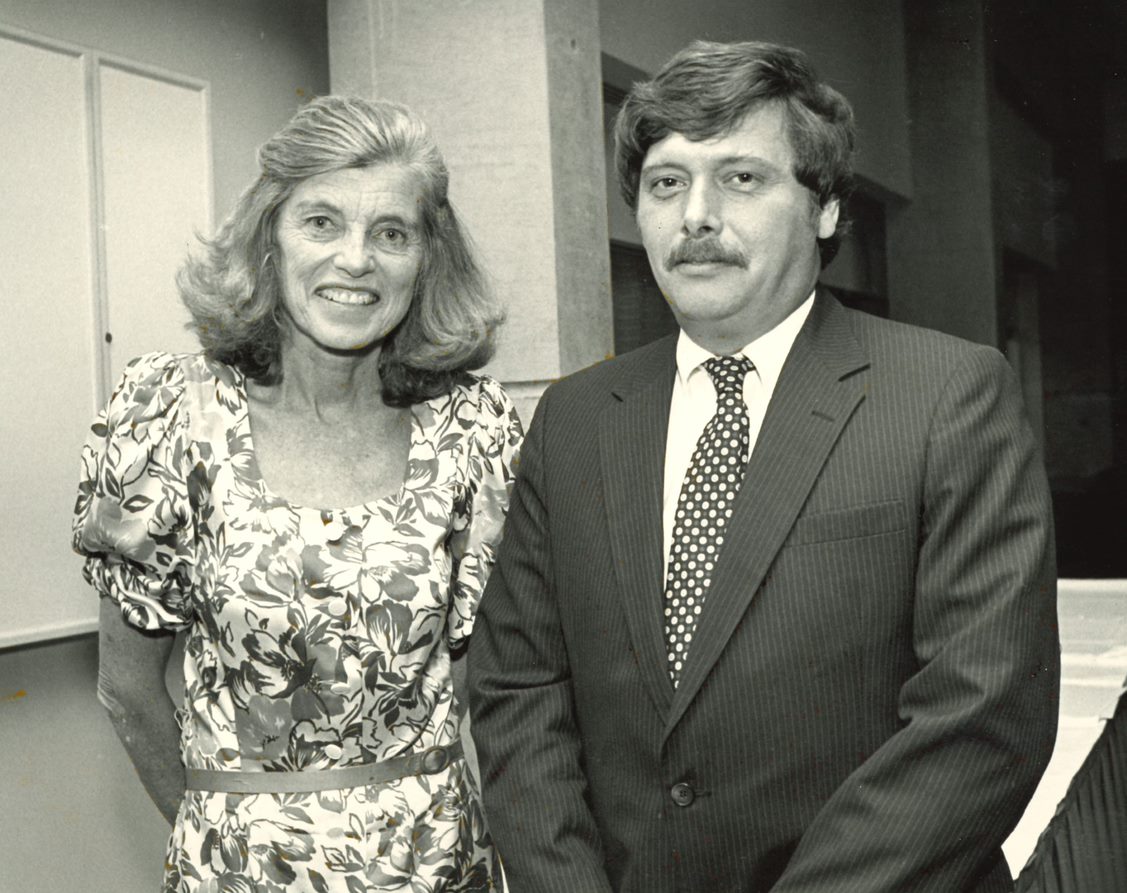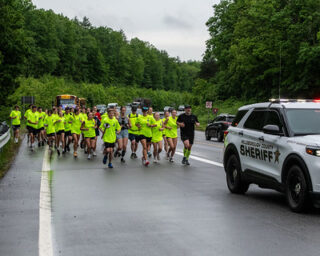History

It all began in the 1950s and early 1960s, when Eunice Kennedy Shriver saw how unjustly and unfairly people with intellectual disabilities were treated. She also saw that many children with intellectual disabilities didn’t even have a place to play. She decided to take action.
Soon, Eunice Kennedy Shriver’s vision began to take shape. She held a summer day camp for young people with intellectual disabilities in her own backyard. The goal was to learn what these children could do in sports and other activities – and not dwell on what they could not do.
Throughout the 1960s, Eunice Kennedy Shriver continued her pioneering work. She was the driving force behind President John F. Kennedy’s White House panel on people with ID. She directed the Joseph P. Kennedy Jr. Foundation. Her vision and drive for justice grew into the Special Olympics movement.
The first International Special Olympics Summer Games are held at Soldier Field in Chicago — a joint venture between the Kennedy Foundation and the Chicago Park District. The advisory committee to the Chicago Special Olympics includes Dr. William Freeberg, Southern Illinois University; Dr. Frank J. Hayden, Joseph P. Kennedy Jr. Foundation; Dr. Arthur Peavy; William McFetridge, Anne McGlone Burke and Stephen Kelly of the Chicago Park District; and Olympic decathlon champion Rafer Johnson. Eunice Kennedy Shriver is honorary chairman. Dr. Hayden was also executive director of the games.
In August of 1968, Special Olympics is officially incorporated. Special Olympics New Hampshire’s history began at those first games in 1968. A timeline of important milestones in New Hampshire’s history is outlined below:
1968
- Six young men, who were residents of Laconia State School, traveled with two Recreation Department staff members to Chicago to participate in the very first Special Olympics World Games
1970
- Mrs. Jean Tufts organizes the 1st Annual Special Olympics New Hampshire State Summer Games at Phillips Exeter Academy
- New Hampshire attends the Special Olympics World Games in Chicago, Illinois
1972
- Special Olympics New Hampshire (SONH) is incorporated as a 501(c)(3) nonprofit organization
- The State Summer Games moves to Plymouth State College
- New Hampshire attends the Special Olympics World Games in Los Angeles, California
1973
- The State Summer Games moves to Keene State College
1974
- The State Summer Games moves to Gill Stadium in Manchester
1975
- Fred Toll is hired as the first paid Executive Director of SONH.
- New Hampshire attends the Special Olympics World Games in Mount Pleasant, Michigan
1976
- The State Summer Games moves to the University of New Hampshire
- Coca-Cola begins its partnership with SONH
1977
- The 1st Annual State Winter Games take place at Eastman in Grantham
- New Hampshire attends the Special Olympics World Games in Steamboat Springs, Colorado
1978
- The State Winter Games moves to Gunstock
- McDonald’s – the Napoli Group begins its partnership with SONH
1979
- New Hampshire attends the Special Olympics World Games in Brockport, New York
1980
- The State Winter Games move to Bretton Woods
1981
- New Hampshire attends the Special Olympics World Games in Stowe, Vermont
1983
- The 1st Annual State Basketball Tournament takes place in Salem
- New Hampshire attends the Special Olympics World Games in Baton Rouge, Louisiana
- Tom O’Brien is hired as SONH’s first full-time program staff person
- SONH has its first office on Union Avenue in Laconia
1985
- Chief Stan Stevens (ret.) of Wolfeboro brings the idea of the Law Enforcement Torch Run to New Hampshire
- New Hampshire attends the Special Olympics World Games in Park City, Utah
1986
- SONH moves its office to Concord
- Mike Quinn is hired as SONH’s second Executive Director
- Associated Grocers (IGA/Wetterau/SuperValu) begins its partnership with SONH
1987
- New Hampshire attends the Special Olympics World Games in South Bend, Indiana
1989
- SONH offers Unified Sports® where people with and without intellectual disabilities compete together as teammates
- New Hampshire attends the Special Olympics World Games in Lake Tahoe, Nevada
- Marshall Tent and Event Rental begins its partnership with SONH
1991
- New Hampshire attends the Special Olympics World Games in Minneapolis & St. Paul, Minnesota
1992
- The 1st Annual State Fall Games take place as St Paul’s School in Concord
1993
- SONH moves its office to Manchester
- New Hampshire attends the Special Olympics World Games in Salzburg & Schladming, Austria
1995
- The State Winter Games move to Waterville Valley
- New Hampshire attends the Special Olympics World Games in New Haven, Connecticut
1996
- The Athlete Leadership Program is introduced
- Special Olympics receives the Walter J Dunphy Excellence in Management Award
1997
- Fleet Bank begins the M&M Fundraiser
- New Hampshire attends the Special Olympics World Games in Toronto, Canada
1998
- SONH Athlete Robert Plant becomes the 1st athlete to be certified as a sport official (golf) by the sport’s National Governing Body (USGA)
- Scott Sargent becomes the 1st athlete elected to the SONH Board of Director’s
1999
- Circle K (Irving Oil) begins Fueling Dreams promotion
- New Hampshire attends the Special Olympics World Games in Raleigh, North Carolina
2000
- The 1st Annual Penguin Plunge takes place at Hampton Beach
2001
- New Hampshire attends the Special Olympics World Games in Anchorage, Alaska
2002
- The Law Enforcement Torch Run exceeds $1 million cumulative dollars raised
- The 1st New Hampshire Association of Chiefs of Police Golf Tournament takes place
2003
- Healthy Athletes screenings are offered for the first time at Summer Games
- New Hampshire attends the Special Olympics World Games in Dublin, Ireland
2005
- The Penguin Plunge exceeds $1 million cumulative dollars raised
- New Hampshire attends the Special Olympics World Games in Nagano, Japan
2006
- Team NH attends Special Olympics USA Games in Iowa
2007
- New Hampshire attends the Special Olympics World Games in Shanghai, China
2008
- Unified Champion Schools (formerly Project UNIFY) begins in New Hampshire
- Young Athletes® programming is offered in New Hampshire
2009
- The 1st Winni Dip takes place at Lake Winnipesaukee
- The 1st High School Plunge takes place at Hampton Beach
- Mary Conroy is hired as SONH’s third Executive Director
- New Hampshire attends the Special Olympics World Games in Boise, Idaho
2010
- NH Interscholastic Athletic Association and SONH offer 1st Unified Sports Event for sanctioned schools
- Team NH attends Special Olympics USA Games in Nebraska
- New Hampshire attends the Athlete Global Congress in Morocco
2011
- New Hampshire attends the Special Olympics World Games in Athens, Greece
2013
- The 1st Cool School Dip takes place at Lake Winnipesaukee
- New Hampshire attends the Special Olympics World Games in Pyeongchang, South Korea
2014
- Team NH attends Special Olympics USA Games in New Jersey
- New Hampshire athlete Pam Langille is selected to serve a four-year term as a Sargent Shriver International Global Messenger
2015
- The 1st Prep School Plunge takes place at Lake Winnipesaukee
- New Hampshire attends the Special Olympics World Games in Los Angeles, CA
2016
- The High School Plunge exceeds $1 million cumulative dollars raised
2017
- The Law Enforcement Torch Run exceeds $5 million cumulative dollars raised
- New Hampshire attends the Special Olympics World Games in Graz & Schladming, Austria
2018
- Team NH attends USA Games in Seattle, WA
2019
- New Hampshire attends the Special Olympics World Games in Abu Dhabi, UAE
2020 (March)
- In-person events suspended due to world-wide COVID-19 pandemic
2022
- Team NH attends USA Games in Orlando, FL
2023

- Winter Water Sports fundraisers raises $1 million
- Special Olympics New Hampshire returns to regular state competition schedule following world-wide COVID-19 pandemic
- New Hampshire attends the Special Olympics World Games in Berlin, Germany
- The first annual Hero’s Cup, Bravest Vs Finest baseball fundraiser is held at Delta Dental Stadium in Manchester
- The first annual Champion’s Together Breakfast is held at the DoubleTree in Manchester
2024

- 2024-2026 Strategic Plan is launched with heavy focus on expanding our reach, enhancing what we do, and engaging our SONH family
- Penguin Plunge fundraiser raises $1 million
- 40th Anniversary of the Law Enforcement Torch Run in New Hampshire
- The Special Olympics New Hampshire Athlete Leadership Council is formed
- The first annual Special Olympics Cornhole Classic fundraiser is held at the DoubleTree in Manchester
